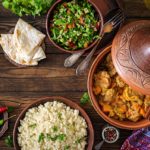
Introduction
Morocco is a vibrant tapestry of history, culture, and tradition. With its rich heritage influenced by Berber, Arab, and French cultures, understanding local customs and etiquette is essential for anyone visiting this enchanting North African country. Whether you’re wandering through bustling souks or sharing a meal with a Moroccan family, being aware of these traditions can enhance your experience and help you connect more deeply with the locals. Here’s a guide to some key Moroccan customs and etiquette to keep in mind during your travels.
1. Greeting Etiquette
In Morocco, greetings are warm and heartfelt. When meeting someone for the first time, a handshake is common, often accompanied by a slight bow of the head. Among friends and family, it’s customary to greet with cheek kisses, starting with the right cheek. When greeting someone, it’s polite to ask how they are, which shows genuine interest in their well-being.
2. Dress Modestly
Moroccan culture values modesty, particularly in rural areas and religious sites. It’s advisable to dress conservatively, especially for women. Loose-fitting clothing that covers the arms and legs is recommended. While in coastal cities like Agadir, beachwear is acceptable at the beach but should not be worn in the streets or markets.
3. Dining Etiquette
Sharing meals is a significant aspect of Moroccan culture. If you are invited to a Moroccan home, it’s customary to bring a small gift, such as pastries or fruit. When dining, you may be offered food from a communal dish; it’s polite to eat with your right hand only, as the left hand is considered impolite for eating. After the meal, washing your hands is a common practice, and tea is often served as a sign of hospitality.
4. Tea Ritual
The Moroccan tea ceremony is an important tradition that reflects the country’s hospitality. Green tea is typically brewed with mint and sugar, and it is served in three rounds. Each round has a distinct flavor, with the first being the sweetest. It’s customary to accept the tea graciously, and if you want more, you can signal for it by raising your glass. Refusing tea can be seen as impolite, so it’s best to accept and enjoy the offering.
5. Respect for Religion
Morocco is predominantly Muslim, and respecting local religious practices is essential. During Ramadan, for example, it is important to be mindful of fasting hours. Eating, drinking, or smoking in public during daylight hours may be considered disrespectful. If you visit mosques or other religious sites, ensure you adhere to the dress code—removing shoes and covering your head, as required.
6. Photography Considerations
While capturing the beauty of Morocco is tempting, always ask permission before photographing individuals, especially in rural areas or markets. Some people may not want their picture taken, and it’s essential to respect their wishes. Additionally, avoid taking pictures of military or police personnel, as this can lead to misunderstandings.
7. Bargaining in Souks
Bargaining is a common practice in Moroccan markets (souks) and is seen as a social interaction rather than a confrontation. When shopping, expect to negotiate prices and engage in friendly banter with shopkeepers. Start by offering a lower price and be prepared to meet somewhere in the middle.
Conclusion
Understanding and embracing Moroccan traditions can greatly enrich your travel experience. By being respectful of local customs and etiquette, you’ll not only show appreciation for the culture but also foster deeper connections with the Moroccan people. Whether you’re enjoying a meal, shopping in the souks, or engaging in conversations, immersing yourself in these traditions will leave you with cherished memories of your time in this beautiful country. Happy travels!






Leave a comment: